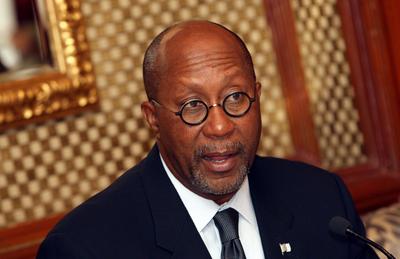Ever since mid-2007, the Doha texts bear unmistakable American fingerprints that point to an effort to shift the goal posts within the negotiation.
What was pursued by the United States at the July 2008 Ministerial in Geneva was beyond the terms of the Hong Kong Ministerial Declaration of 2005, which the United States had been party to. And what has been pursued by USTR Kirk and Deputy USTR Punke this spring in Geneva with regard to sectoral tariff elimination/reductions within the industrial goods negotiation pillar (itself over-and-beyond the Hong Kong mandate) is beyond what was proposed on this issue at the 2008 Geneva Ministerial — that advanced developing countries preferably, although ‘non-mandatorily,’ participate in at least two sectoral initiatives of their choosing. Altogether, this begs the question: when and where does this goal post shifting end? And, further, what exactly then is the purpose of expending significant amounts of time and energy to craft consensus negotiating frameworks involving the United States if such frameworks are going to be disregarded a couple of months hence … shades, frankly, of the North Korean approach (minus the fireworks) to the Six Party Talks: each agreed-upon framework providing principally a departure point for an adjusted set of additional demands.
Let’s be clear here: advanced developing country acquiescence to an expanded United States sectoral tariff elimination/reduction package in Geneva will not tip the Doha Round over the finish line. Parenthetically, it bears noting, the key parties that need to sign-on for the chemicals, industrial machinery, electronics and electrical products, and forest products sectorals to attain a critical mass of participation are — China apart — Korea, Mexico, Taiwan and, in some instances, the European Union, i.e. mainly Washington’s allies or FTA partners. But more pointedly, the July 2008 Ministerial had collapsed, both, fundamentally and proximately over agricultural trade access issues, notably the ‘triggers’ for the Special Safeguard Mechanism (SSM) for developing countries as well as the related inability to devise an appropriate subsidies reduction-for-market access ‘exchange rate’ bargain between developed and developing countries.
At this time, these issues still remain outstanding … with USTR Kirk, in fact, lately attempting to funnel these agricultural market access objectives via the back-door, demanding that constraints be placed on developing countries’ prerogative to self-designate their ‘special products’ list — yet another circumvention of the 2005 Hong Kong Declaration. Thereafter, the Rules text needs firming up, a negotiation that is likely to invite a throwback performance in resolute defense by Washington, given its outlier devotion to the ‘zeroing’ methodology while calculating anti-dumping margins. And so on-and-on the negotiations are expected to continue, leashed, flailing and thrashing to the evolving demands of Washington — a few of which incredibly, even at this late hour, remain formally unarticulated, such as its offer on ‘cotton.’ All told, this begs the question: how does one devolve trust in a multi-party negotiation with many moving parts when the determination of what constitutes shared compromise is the unilaterally arrogated judgment of just one party to the negotiation, albeit a key one. Washington’s attitude ‘let’s all make sacrifices, going forward, and I’ll determine what your sacrifices need to be’ begs adjustment.
Further, the distinction between multilateral and bilateral FTA negotiations too begs internalization — that the leverage the United States possesses in the latter format to string its hand-picked partners around in an interminably elastic process that caters to congressional and corporate whim is simply not tenable at the multilateral level, even within a restricted contact group surrounding. USTR’s most recently negotiated FTA in effect (Peru FTA of 2006) was negotiated, renegotiated and then re-renegotiated one final time by a congressional delegation no less (led by then-House ways and means chairman Charlie Rangel) in Lima. The Columbia, Panama and Korea FTAs, variously, have been subject to similar processes and the on-going Trans-Pacific Partnership’s (TPP) negotiation dynamics displays every sign of such asymmetry being brought to bear. Presuming however that Doha and the BIICS — Brazil, India, Indonesia, China, South Africa — countries therein can be bent to similar will is neither plausible nor tenable. Framework agreements/modalities need to have some reciprocally-binding meaning; new obligations cannot simply emerge mid-stream (and unilaterally) in a multilateral negotiation.
Oh, and at climate change talks, the United States is staking out positions mid-stream that abet not just disregard for legally-binding baselines but which also embody the potential to unravel and collapse the UNFCCC (United Nations Framework Convention for Climate Change) architecture, built as it is around a basic differentiation between developed and developing country obligations. Little wonder then that the BASIC — Brazil, South Africa, India, China — countries have dug their heels-in, reluctant to renegotiate the climate regime architecture, and that too for the uncertain promise of American engagement. You get the picture where this is all heading …
Sourabh Gupta is a Senior Research Associate at Samuels International Associates, Inc. in Washington DC, and a contributor to EAF.

